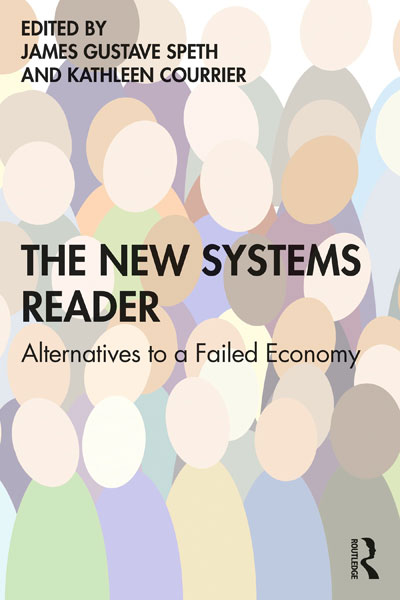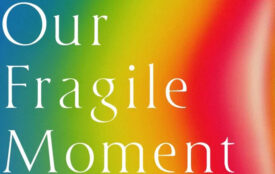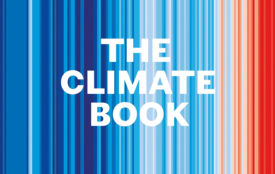New Systems – A Reader
The recent Corona pandemic has made the question of economic, social and ecological transformation ever more urgent. Truly addressing the problems of the 21st century requires going beyond small tweaks and modest reforms to business as usual – it requires „changing the system“. An illuminative and provocative book has appeared on the topic – a first assessment by Professor Udo E. Simonis.
James Gustave („Gus“) Speth, one of the editors of this new book, became world-renowned by several of his functions: as founder of the World Resources Institute, as Aministrator of the United Nations Development Programme (UNEP), as Dean of the Yale School of Forestry and Environmental Studies. But he also is a talented author, particularly shown with his books „Red Sky at Morning: America and the Crisis of the Global Environment“, 2004, and „The Bridge at the Edge of the World: Capitalism, the Environment, and Crossing from Crisis to Sustainability“, 2008.
The crisis has become more visible and dangerous since. So, Speth started „The Next System Project“, launched by „The Democracy Collaborative“ with the support of more than 300 scholars and activists to promote systemic solutions for an age of systemic crisis. This project combines research, understanding and strategic thinking with on-the-ground organizing and development experience to promote visions, models, and pathways for a „next system“ – a system capable of delivering economic, social and ecological outcomes superior to those of the failed systems of the past and present.
Together with Kathleen Courrier Gus Speth has now published the first book of the project: In 7 parts and 29 essays they have assembled 38 top systems thinkers and activists (mostly US-Americans) to offer a multitude of possible paths toward a better future for the people and the planet.
They start with some philosophical moments: „Systems have a way of making us forget they exist….To understand that a system exists is to imagine the possibility of it being otherwise. To further understand that the system is fundamentally flawed is to imagine the possibility of someting much better – a new system“ (p. xx).
But what does it really mean to „change the system“? The editors primary goal is to dispel the deadly notion that nothing can be done – that today‘s corporate capitalism as we know it is the best, and in any case, the only possible option. Fortunately, they say, many alternative visions exist, buttressed by the work of individuals and increasingly sophisticated networks of reserach and reflection. These proposals map out potential futures for us to consider. And they lead to the conclusion that the current corporate capitalist system can be superseded by a system that is equitable, green, democratic and just.
The second main goal of the editors is to carefully study and present the rich diversity of systemic visions, and also to look for the choices on the road to synthesis. This is so as all the thinkers and activists enlisted in the book start from a similar recognition of the current system, but all end up somewhere with differing suggestions and priorities. The pathways they identify also vary considerably – from local self-regulation to top-down reconstruction, from the rewiring of values to the rewiring of ownership. There are many alternatives – so which one to go for? The editors wanted to learn what questions are at stake in this choice – and asked the authors to pay regard to this request.
For the reviewer it is impossible to present all the visions, models and pathways dealt with in the 29 essays of the book in detail. A short, condensd presentation of the main ideas should suffice.
Part I is on „Social Democracy and Radical Localism“. It features three approaches to building a different economy. The authors propose visions grounded in significant reforms that stop short of a truly revolutionary transformation. But they offer different structures based on governing principles different from what we generally see today.
The first essay draws inspiration from the Scandinavian countries, and models „social democratic capitalism“. In this model system, government should play a key role in improving economic and living conditions, and minimizng inequality. The details of that role include a progressive income tax to cover the cost of a safe „income floor“ for the less well-off.
The second essay also posits a social democratic system but with a mixed economy. The production and sale of some goods would happen in a profit-seeking market while vital public goods (such as healthcare services) would not. The author calls for prioritizing enligthened politics over economic interests, and for embracing diverse ownership models.
In the third essay, the author proposes radical localism to create „a million utopias“. Pointing to the case of highly decentralized Switzerland, he argues that a compelling direction for systemic transformation of a country is through the principle of subsidiarity, in which decisions are made closest to the people – at the state and local level. Open markets coupled with robust antitrust enforcement would keep enterprises „diverse, small, and competitive“. The strongest argument for decentralisation as a path to systemic change, the author ends, is that in many countries in the world it is happening already.
Part II of the book is on „New System Values“. Five essays explore how values can and should shape system design and outcomes. The first one offers a plan for an „ethical market economy“: By focusing on increasing the quality of life, promoting human dignity and rights, and ensuring ecological responsibility and social justice, the two authors argue that the economy can truly serve the public good. To assure that goal, they propose a „new bottom-line“: Instead of adoring the gross domestic product (GDP), a „common good product“ should measure quality of life, the meeting of basic needs, and environmental stewardship.
The second essay presents a model of a „civic economy of provisions“ to ensure that all people would have access to food, housing, healthcare, and education.
The third text looks at the study of „relational dynamics“, not between dualities, such as capitalism and socialism, but between a „domination“ model and a „partnership“ model. The partnership model is characterized by democratic decision-making rather than authoritarianism, by gender equality rather than the subordination of woman, and by an end to all kinds of violence.
The next essay contrasts a „suicide economy“ with a „living Earth economy“. The suicide economy estimates life only for its market value and prioritizes profit over community and social well-being. Its „money is sacred“ story pervades economics, law and democracy. Instead, „life is sacred“ is centerd in the „living Earth economy“. Emphasizing these values, the author calls for a system transformation that shifts power from global corporations to self-reliant and deeply democratic, self-governing, bioregional communities.
The final essay in this part of the book offers a dispatch from the future in „Earthland“. Set in the year 2084, the world has emerged from a period of various crises and has moved to a radically different system where resilient economies constrain markets to function under compassionate social norms and strict environmental rules. Politically, „Earthland“ is organized through constrained pluralism, based on the principle of subsidiarity – a recognition of globalism („One World“) with a parallel focus on local diversity („Many Places“). As futuristic tales often do, this essay offers readers – offered me – words from the future to give hope to the present. („Another world was possible“.)
Part III of the book is called „A Planetary Economy“. Its four essays offer a wide range of possibilities to „flourish on a finite planet“. A basic question is whether capitalism is up to the task of combining broad prosperity with environmentral sustainability. „Not in its current stage“ – all the authors agree. But how different the economies of the future must be is a matter of heavy debate.
The authors of the first essay outline the need for a new ecological macroeconomic model that accurately reflects the real economy’s structure, takes full account of the ecological and resource constraints, and incorporates a consistent description of the financial economy. Adopting that model would mean changing the kind of enterprise, the purpose of work, the structure of investments, and the operation of the debt-based money and finance systems. Elements of such a system, it is pointed out, already exist in places like farmers’s markets, and various kinds of cooperatives.
The second essay tackles the framework of measurement by which the economy is steered and controlled. Instead of using „gross domestic product“ to measure economic progress, the author calls for a „dashboard“ of indicators to measure the well-being of people, taking into consideration the negative effects of pollution and wastes, and the benefits coming from housholds‘ work, small businesses and non-profit organizations.
„Toward Democratic Eco-socialism as the Next World System“ is the title of the third essay, probably the most provocative vision of the book. The author describes a system that takes into account the fragility of the planet and its limited resources through equitable distribution mechanisms. It would emerge through „system-challenging reforms“ that address the historical failings of both capitalist and socialist societies. Key features of the model include public ownership of the means of production and a representative and participatory democracy, and a strict distinction between „growth“ and development“. Eco-socialism would aim to meet people’s basic needs, protect the environment and create a high degree of social equality.
In the last essay the author challenges the notion that „green economy proposals“ and „degrowth strategies“ alone can save us from global ecological collapse. Instead, six theses make up the heart of the proposed system for saving the planet: substantial cuts in fossil fuel consumption; a „dignified“ and sustainable living standard for all; production of goods that are durable, rebuildable, recyclable, and shareable; investments in public needs, including renewable energy, infrastructure, and public education; systemic approaches to managing waste and toxics; and assurances of quality jobs for displaced workers.
Part IV is on „Ownership and Economic Democracy“. Three essays explore options for bringing the economy, the government, the financial sector, and the workplace under democratic control. The first model presented has neither capital markets nor labor markets in the usual sense. Workers would control their own jobs and workplaces, while productive resources would become the collective property of society, and investment decisions would be under social control. The framework of the model includes a right to employment, reconstruction of the financial sector, an entrepreneurial sector to drive innovations, and a social tariff to encourage fair trade between nations while discouraging race-to-the-bottom trade deals. Transitioning to a non-capitalist system requires changing the who and the why of economic decison-making. In view of the author, creating Worker Self-Directed Enterprises (WSDEs) represents both the goal of a new system and the mechanism for reaching it.
While these two models focus on worker ownership, the tird one examines public ownership as a way for workers, consumers, and citizens to participate in economic decision-making and exercise community control over resources. Seven different types of public ownerships are explored on how they could be strategically incorporated across a country. Public ownership of oil production in Norway and renewably energy in Denmark exemplify this model.
Part V is on „Community-Based Pluralist Systems“. Our current economic system, the authors remind the reader, was built for speed and efficiency – without much respect for building community, cultivating beneficial interactions, and ensuring that industrial metabolism doesn’t rend our social fabric and damage the planet. The essays in this part of the book therefore delve into ways on which system change should evolve from the basic relationships we want to have and the communities we want to build. Arguing for a „pluralist commonwealth“ the first essay asserts that the central challenge of the emerging era is building community – exemplified in democratization of wealth, decentralization, and democratic planning.
The aim of the essay by Gus Speth, one of the editors of the book, is two-fold: He deplores the „joyless economy“ we are in, and asks for a radically new system to create and sustain joy. Joy comes not from money but from „other people“. We flourish in a setting of warm, nurturing, and rewarding interpersonal relationships – in giving, not getting. Speth’s „new America“ would be more democratic, designed to encourage and sustain human solidarity, devoted friendship, and meaningful accomplishments, structured to ensure that economic benefits are shared equitably and commited to sustaining the natural environment for current and future generations. Speth asserts that more and more Americans are discussing the need for a „great and just transition“. (The reviewer especially enjoyed the pages on „The Environmentalist’s Tale“, pp. 254-258, a critique and self-critique of environmentalism in the US).
The following essays describe a system of interlocking, grassroots solidarity, the „solidarity economy“ as a global system, and cooperative economic democracy based on principles of „resilience“, particularly on diversity, modularity, and redundancy. Practical examples of such innovative models are quoted from North-America, Europe, and Latin America.
Part VI is called „Commoning, Cooperation, and Participatory Planning“. Neither the capitalist economy nor the authoritarian planned economy allows for a third possibility: an economy shaped not by the whims of moneyed or state interests, but by the shared concerns and aspirations of the people. The authors in this group of essays imagine the ramifications of the transformation when people become a decisive economic power.
The first essay explores the scope and role of the „commons“, as a starting point for envisioning an alternative to neoliberal capitalism. The author argues for an expansive definition of what is in the commons. No „tragedy of the commons“
needs to arise to justify privatization. Rather, commons-based new systems could be many, and could be flexible enough when controlled by communities and responsive to their needs.
The next author emphasizes the social control of capital in his call for a pluralist „cooperative commonwealth“ based on the principles of economic democracy. In such a system new information and communications technology could enhance an emerging „generative democracy“ that mirrors the ethos that has given the world such digital common resources as Wikipedia.
Two more essays present ideas on improved participatory planning. The authors state that the participatory vision does not assume a population of omniscient and morally saintly people. Simple structures could enable and facilitate community-serving results, but there is also the possibility to installing special stakeholder councils. The author ends with a really imaginative conclusion: „We must convince the majority that ordinary people are perfectly capable of managing economic affairs – without either capitalist employers or political commissars to tell us what to do“.
Part VII is on „The Emerging New Economy“. Around the world, new economic systems are not just futuristic ideas mused upon in sophisticated essays and debated in universities. They are already being built right now. The authors of the essays in this final part of the book number among those builders.
Arising from a feminist critique of political economy that rejects its features of dominance and subordination, the authors of the first essay write about their work around the globe, and present their vision of „community economies“. More than a dozen worldwide projects illustrate how these collective actions work in practice, what their successes are and how their problems are solved through internattional communication. Two authors write about their „solidarity economics strategies and practises“ that range from the establishment of community land trusts and production cooperatives that offer training in digital fabrication.
In another essay, three members of the Boston Ujima Project make reparations the focus of their vision: Reparation, they understand, is not simply compensation for the labor stolen, lives taken, and opportunities lost to institutionalized racism. Members of Boston’s working-class communities of color therefore work together to identify economic development priorities and to allocate finance through a participatory process, designed to favour the historically marginalized and impoverished.
In the last essay, a member of the Tanzanian Parliament offers lessons from the country’s experiences after then-President Julius Nyerere in 1967 issued the landmark „Arusha Declaration“ which put forward an African socialist vision.
For many years, Tanzania followed its precepts, with strict government control of the economy. But then, external events and internal missteps brought the economy into crisis. By 1986, the country accepted bailout terms set by the International Monetary Fund and the World Bank which demanded the large-scale privatization of the Tanzanian economy. With privatization came the „foreignization“ of outside private capital, and the De-Industrialization when that capital chose to leave the country. In 2015, the new government issued the „Tabora Declaration“, a call for a return to the principles of the Arusha Declaration in a 21st-century context.
Some conclusions: Its nearly impossible to appraise this voluminous book with a few sentences. It is certainly a treasure of innovative, illuminative and provocative ídeas, with compelling alternatives that promise an egalitarian, humane, and sustainable future. It thus could play an important role in system change. It is a must-read for all interested in models for a better world. As a European I would really like to see a similar book on the overdue debate on system change in Europe.
However, a critical judgement could be that the book is just to laborious to become politically relevant. We certainly would need a shorter and cheaper version to reach the young generation, the „Friday for Future“ movement. A more serious question regarding its political relevance is when and where to start system change; in which way should and must individual visions and pathways be interconnected? Is drastic or peacemeal procedure more promising? Some readers of the book (and of this review) may even think: Is it more than only a little utopian? Here I would answer with a word by Gus Speth, the editor: „Utopian vision is precisely what today‘s situation requires. Things are so bad that there is no room for pessimism“ (p. 53).
Source
Dr. Dr. h.c. Udo E. Simonis 2019 ist Professor Emeritus für Umweltpolitik am Wissenschaftszentrum Berlin (WZB)









